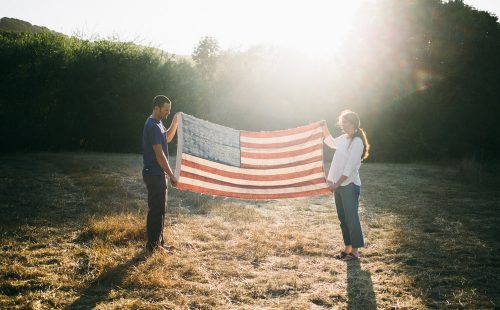The legal status of hemp remains one of the more confusing and challenging issues in the politics of cannabis legalization. Never mind that the first-ever American flag was sewn with hemp and it had been a valuable crop for American farmers during World War II before U.S. cannabis prohibition.
The varietal of the Cannabis sativa species has had a longstanding, divided history in America, remaining on Schedule I of the federal Controlled Substances Act for its relation to marijuana and is highly restricted for industrial growth, yet legal for import from any one of the 30 countries around the world that have large-scale hemp farming. Domestically, there is a gray area for growing hemp on a state-by-state basis, thanks to the 2014 Farm Bill.
As of March 2016, more than half of the 50 states have laws that allow for some hemp production, according to this chart. Yet, many states, such as California, will only allow for industrial hemp cultivation when federal law coincides with state law. That is, when Congress passes a bill permitting industrial hemp across the U.S.
The Agricultural Act of 2014, more commonly known as the Farm Bill, did open a few doors: namely, allowing states to experiment with hemp for research purposes. Plus it defined industrial hemp as having less than 0.3% of THC, compared to marijuana, which has 10-30%.
Some states are ramping up growth of the non-intoxicating crop. In Colorado, hemp has established a foothold alongside the state’s recreational marijuana development. Two years ago, Colorado Cultivars’ Rick Trojan found a wild hemp plant growing on the side of the road in the northeast part of the state near Eaton, and has since turned it into one of the largest operations in the country, with plans to plant between 1,500 and 2,500 acres this year — more than all of the Colorado hemp planted in 2015. Meanwhile, Colorado State University is studying hemp varieties on the Western Slope and is working with the state Department of Agriculture to develop a state seed certification program.
Hemp farming in the USA
It’s been awhile: This is the first time hemp’s been planted in West Virginia legally since WWII
Move aside, corn: Nebraska researchers receive permit to use hemp as field crop
Try this: Nine cannabis-enhanced beauty products you need right now
About time: Victory for South Dakota tribal hemp farmer as judge lifts decade-old injunction
Weed news and interviews: Get podcasts of The Cannabist Show.
Subscribe to our newsletter here.
Watch The Cannabist Show.
Peruse our Cannabist-themed merchandise (T’s, hats, hoodies) at Cannabist Shop.
Kentucky also quickly took advantage of the Farm Bill, beginning in 2014 with half a dozen universities taking part in test plantings, and received authorization this year to plant nearly 4,500 acres of hemp.
Enter Patagonia, which like hemp clothing company Jungmaven, is fighting for federal legalization for farmers. Far beyond their headquarters in Ventura, California, the eco-friendly activewear authority is also acting as an advocate, producing the short film “Harvesting Liberty,” below.
The film serves as a tool to promote the passage of the Industrial Hemp Act (S.134 and H.R. 525), and a supporting citizen petition was presented to Congress on July 4. Micah Nelson (Willie Nelson’s son) is also at the helm, in partnership with the National Hemp Association.
The film’s director (and Patagonia employee) Dan Malloy heads to the hemp fields of the Bluegrass State to document the work of two visionaries: Michael Lewis, whose Growing Warriors program trains, assists and equips military veterans on how to grow organic produce for their families and communities; and Rebecca Burgess, who founded Fibershed — a nonprofit that received a grant from Patagonia to build Lewis a decorticator (a machine used for processing hemp plants).

It’s a harmonious collaboration to spread awareness of reintroducing industrial hemp into the American landscape with the help of a big-name corporate partner. Patagonia founder Yvon Chouinard first started investigating hemp in 1993, soon discovering a source in China — the very place where the plant first originated and dates back to 5000 B.C. Since then, the brand has used hemp across its line of high-performance garments, with the hope that one day it could be sourced stateside.
“As a strong fiber, hemp has many great properties that fit Patagonia’s environmental commitments: It requires no irrigation, uses no pesticides or synthetic fertilizers, and is harvested and processed by hand,” a Patagonia spokesperson tells The Cannabist. “It’s a strong fiber that wears cool in hot weather (similar to linen). The potential market in the outdoor industry for U.S.-grown hemp is substantial. Recently, we’ve been testing innovative new hemp fabrics that show impressive results compared to some pieces made from 100% organic cotton.”
The Patagonia spokesperson says of the goal for the film: “The greatest obstacle is the fundamental misconception that industrial hemp is the same as marijuana, which can be overcome with education about the difference between the two crops.”
